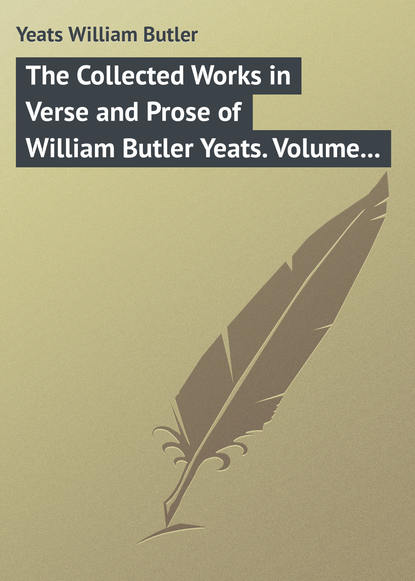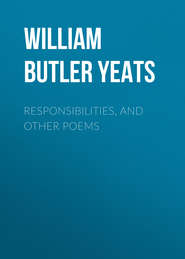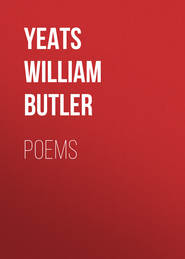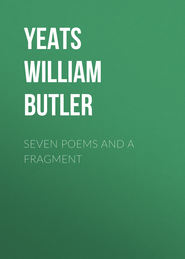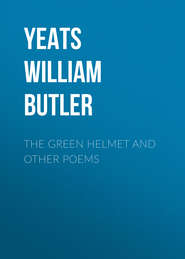По всем вопросам обращайтесь на: info@litportal.ru
(©) 2003-2024.
✖
The Collected Works in Verse and Prose of William Butler Yeats. Volume 3 of 8. The Countess Cathleen. The Land of Heart's Desire. The Unicorn from the Stars
Настройки чтения
Размер шрифта
Высота строк
Поля
O! the brown and the yellow beer,
And I met with a man that was no right man,.
Oh my dear, my dear.
CATHLEEN NI HOULIHAN
CATHLEEN NI HOULIHAN
Florence Farr
I
I will go cry with the woman,
For yellow-haired Donough is dead,
With a hempen rope for a neck-cloth,
And a white cloth on his head.
II
Do not make a great keening
When the graves have been dug tomorrow.
III
They shall be remembered forever
[repeat 3 times]
The people shall hear them forever.
MUSIC FOR LYRICS
Three of the following settings are by Miss Farr, and she accompanies the words upon her psaltery for the most part. She has a beautiful speaking-voice, and, an almost rarer thing, a perfect ear for verse; and nothing but the attempting of it will show how far these things can be taught or developed where they exist but a little. I believe that they should be a part of the teaching of all children, for the beauty of the speaking-voice is more important to our lives than that of the singing, and the rhythm of words comes more into the structure of our daily being than any abstract pattern of notes. The relation between formal music and speech will yet become the subject of science, not less than the occasion of artistic discovery; for I am certain that all poets, even all delighted readers of poetry, speak certain kinds of poetry to distinct and simple tunes, though the speakers may be, perhaps generally are, deaf to ordinary music, even what we call tone-deaf. I suggest that we will discover in this relation a very early stage in the development of music, with its own great beauty, and that those who love lyric poetry but cannot tell one tune from another repeat a state of mind which created music and yet was incapable of the emotional abstraction which delights in patterns of sound separated from words. To it the music was an unconscious creation, the words a conscious, for no beginnings are in the intellect, and no living thing remembers its own birth.
I give after Miss Farr’s settings three others, two taken down by Mr. Arnold Dolmetsch from myself, and one from a fine scholar in poetry, who hates all music but that of poetry, and knows of no instrument that does not fill him with rage and misery. Mr. Arnold Dolmetsch, when he took up the subject at my persuasion, wrote down the recitation of another lyric poet, who like myself knows nothing of music, and found little tunes that delighted him; and Mr. George Russell (‘A.E.’) writes all his lyrics, a musician tells me, to two little tunes which sound like old Arabic music. I do not mean that there is only one way of reciting a poem that is correct, for different tunes will fit different speakers or different moods of the same speaker, but as a rule the more the music of the verse becomes a movement of the stanza as a whole, at the same time detaching itself from the sense as in much of Mr. Swinburne’s poetry, the less does the poet vary in his recitation. I mean in the way he recites when alone, or unconscious of an audience, for before an audience he will remember the imperfection of his ear in note and tone, and cling to daily speech, or something like it.
Sometimes one composes to a remembered air. I wrote and I still speak the verses that begin ‘Autumn is over the long leaves that love us’ to some traditional air, though I could not tell that air or any other on another’s lips, and The Ballad of Father Gilligan to a modification of the air A Fine Old English Gentleman. When, however, the rhythm is more personal than it is in these simple verses, the tune will always be original and personal, alike in the poet and in the reader who has the right ear; and these tunes will now and again have great beauty.
NOTE BY FLORENCE FARR
I made an interesting discovery after I had been elaborating the art of speaking to the psaltery for some time. I had tried to make it more beautiful than the speaking by priests at High Mass, the singing of recitative in opera and the speaking through music of actors in melodrama. My discovery was that those who had invented these arts had all said about them exactly what Mr. Arnold Dolmetsch and Mr. W. B. Yeats said about my art. Anyone can prove this for himself who will go to a library and read the authorities that describe how early liturgical chant, plain-song and jubilations or melismata were adapted from the ancient traditional music; or if they read the history of the beginning of opera and the ‘nuove musiche’ by Caccini, or study the music of Monteverde and Carissimi, who flourished at the beginning of the seventeenth century, they will find these masters speak of doing all they can to give an added beauty to the words of the poet, often using simple vowel sounds when a purely vocal effect was to be made whether of joy or sorrow. There is no more beautiful sound than the alternation of carolling or keening and a voice speaking in regulated declamation. The very act of alternation has a peculiar charm.
Now to read these records of music of the eighth and seventeenth centuries one would think that the Church and the opera were united in the desire to make beautiful speech more beautiful, but I need not say if we put such a hope to the test we discover it is groundless. There is no ecstasy in the delivery of ritual, and recitative is certainly not treated by opera-singers in a way that makes us wish to imitate them.
When beginners attempt to speak to musical notes they fall naturally into the intoning as heard throughout our lands in our various religious rituals. It is not until they have been forced to use their imaginations and express the inmost meaning of the words, not until their thought imposes itself upon all listeners and each word invokes a special mode of beauty, that the method rises once more from the dead and becomes a living art.
It is the belief in the power of words and the delight in the purity of sound that will make the arts of plain-chant and recitative the great arts they are described as being by those who first practised them.
THE WIND BLOWS OUT OF THE GATES OF THE DAY
THE WIND BLOWS OUT OF THE GATES OF THE DAY.[D] (#n__45_46)
Florence Farr
The wind blows out of the gates of the day,
The wind blows over the lonely of heart,
And the lonely of heart is withered away,
While the fairies dance in a place apart,
Shaking their milkwhite feet in a ring,
Tossing their milkwhite arms in the air
For they hear the wind laugh and murmur and sing
Of a land where even the old are fair
And even the wise are merry of tongue.
But I heard a reed of Coolaney say,
When the wind has laughed and murmured and sung,
The lovely of heart must wither away.
THE HAPPY TOWNLAND
THE HAPPY TOWNLAND.[4 - The music as written suits my speaking voice if played an octave lower than the notation. – F.F.]
Florence Farr
O Death’s old bony finger
Will never find us there
In the high hollow townland
Where love’s to give and to spare;
Where boughs have fruit and blossom
at all times of the year;
Where rivers are running over
With red beer and brown beer.
An old man plays the bagpipes
In a gold and silver wood;
Queens, their eyes blue like the ice,
Are dancing in a crowd.
Chorus
The little fox he murmured,
‘O what of the world’s bane?’
The sun was laughing sweetly,
The moon plucked at my rein;
But the little red fox murmured,
‘O do not pluck at his rein,
He is riding to the townland
That is the world’s bane.’
I HAVE DRUNK ALE FROM THE COUNTRY OF THE YOUNG
I HAVE DRUNK ALE FROM THE COUNTRY OF THE YOUNG.[5 - To be spoken an octave lower than it would be sung. – F.F.]
And I met with a man that was no right man,.
Oh my dear, my dear.
CATHLEEN NI HOULIHAN
CATHLEEN NI HOULIHAN
Florence Farr
I
I will go cry with the woman,
For yellow-haired Donough is dead,
With a hempen rope for a neck-cloth,
And a white cloth on his head.
II
Do not make a great keening
When the graves have been dug tomorrow.
III
They shall be remembered forever
[repeat 3 times]
The people shall hear them forever.
MUSIC FOR LYRICS
Three of the following settings are by Miss Farr, and she accompanies the words upon her psaltery for the most part. She has a beautiful speaking-voice, and, an almost rarer thing, a perfect ear for verse; and nothing but the attempting of it will show how far these things can be taught or developed where they exist but a little. I believe that they should be a part of the teaching of all children, for the beauty of the speaking-voice is more important to our lives than that of the singing, and the rhythm of words comes more into the structure of our daily being than any abstract pattern of notes. The relation between formal music and speech will yet become the subject of science, not less than the occasion of artistic discovery; for I am certain that all poets, even all delighted readers of poetry, speak certain kinds of poetry to distinct and simple tunes, though the speakers may be, perhaps generally are, deaf to ordinary music, even what we call tone-deaf. I suggest that we will discover in this relation a very early stage in the development of music, with its own great beauty, and that those who love lyric poetry but cannot tell one tune from another repeat a state of mind which created music and yet was incapable of the emotional abstraction which delights in patterns of sound separated from words. To it the music was an unconscious creation, the words a conscious, for no beginnings are in the intellect, and no living thing remembers its own birth.
I give after Miss Farr’s settings three others, two taken down by Mr. Arnold Dolmetsch from myself, and one from a fine scholar in poetry, who hates all music but that of poetry, and knows of no instrument that does not fill him with rage and misery. Mr. Arnold Dolmetsch, when he took up the subject at my persuasion, wrote down the recitation of another lyric poet, who like myself knows nothing of music, and found little tunes that delighted him; and Mr. George Russell (‘A.E.’) writes all his lyrics, a musician tells me, to two little tunes which sound like old Arabic music. I do not mean that there is only one way of reciting a poem that is correct, for different tunes will fit different speakers or different moods of the same speaker, but as a rule the more the music of the verse becomes a movement of the stanza as a whole, at the same time detaching itself from the sense as in much of Mr. Swinburne’s poetry, the less does the poet vary in his recitation. I mean in the way he recites when alone, or unconscious of an audience, for before an audience he will remember the imperfection of his ear in note and tone, and cling to daily speech, or something like it.
Sometimes one composes to a remembered air. I wrote and I still speak the verses that begin ‘Autumn is over the long leaves that love us’ to some traditional air, though I could not tell that air or any other on another’s lips, and The Ballad of Father Gilligan to a modification of the air A Fine Old English Gentleman. When, however, the rhythm is more personal than it is in these simple verses, the tune will always be original and personal, alike in the poet and in the reader who has the right ear; and these tunes will now and again have great beauty.
NOTE BY FLORENCE FARR
I made an interesting discovery after I had been elaborating the art of speaking to the psaltery for some time. I had tried to make it more beautiful than the speaking by priests at High Mass, the singing of recitative in opera and the speaking through music of actors in melodrama. My discovery was that those who had invented these arts had all said about them exactly what Mr. Arnold Dolmetsch and Mr. W. B. Yeats said about my art. Anyone can prove this for himself who will go to a library and read the authorities that describe how early liturgical chant, plain-song and jubilations or melismata were adapted from the ancient traditional music; or if they read the history of the beginning of opera and the ‘nuove musiche’ by Caccini, or study the music of Monteverde and Carissimi, who flourished at the beginning of the seventeenth century, they will find these masters speak of doing all they can to give an added beauty to the words of the poet, often using simple vowel sounds when a purely vocal effect was to be made whether of joy or sorrow. There is no more beautiful sound than the alternation of carolling or keening and a voice speaking in regulated declamation. The very act of alternation has a peculiar charm.
Now to read these records of music of the eighth and seventeenth centuries one would think that the Church and the opera were united in the desire to make beautiful speech more beautiful, but I need not say if we put such a hope to the test we discover it is groundless. There is no ecstasy in the delivery of ritual, and recitative is certainly not treated by opera-singers in a way that makes us wish to imitate them.
When beginners attempt to speak to musical notes they fall naturally into the intoning as heard throughout our lands in our various religious rituals. It is not until they have been forced to use their imaginations and express the inmost meaning of the words, not until their thought imposes itself upon all listeners and each word invokes a special mode of beauty, that the method rises once more from the dead and becomes a living art.
It is the belief in the power of words and the delight in the purity of sound that will make the arts of plain-chant and recitative the great arts they are described as being by those who first practised them.
THE WIND BLOWS OUT OF THE GATES OF THE DAY
THE WIND BLOWS OUT OF THE GATES OF THE DAY.[D] (#n__45_46)
Florence Farr
The wind blows out of the gates of the day,
The wind blows over the lonely of heart,
And the lonely of heart is withered away,
While the fairies dance in a place apart,
Shaking their milkwhite feet in a ring,
Tossing their milkwhite arms in the air
For they hear the wind laugh and murmur and sing
Of a land where even the old are fair
And even the wise are merry of tongue.
But I heard a reed of Coolaney say,
When the wind has laughed and murmured and sung,
The lovely of heart must wither away.
THE HAPPY TOWNLAND
THE HAPPY TOWNLAND.[4 - The music as written suits my speaking voice if played an octave lower than the notation. – F.F.]
Florence Farr
O Death’s old bony finger
Will never find us there
In the high hollow townland
Where love’s to give and to spare;
Where boughs have fruit and blossom
at all times of the year;
Where rivers are running over
With red beer and brown beer.
An old man plays the bagpipes
In a gold and silver wood;
Queens, their eyes blue like the ice,
Are dancing in a crowd.
Chorus
The little fox he murmured,
‘O what of the world’s bane?’
The sun was laughing sweetly,
The moon plucked at my rein;
But the little red fox murmured,
‘O do not pluck at his rein,
He is riding to the townland
That is the world’s bane.’
I HAVE DRUNK ALE FROM THE COUNTRY OF THE YOUNG
I HAVE DRUNK ALE FROM THE COUNTRY OF THE YOUNG.[5 - To be spoken an octave lower than it would be sung. – F.F.]





